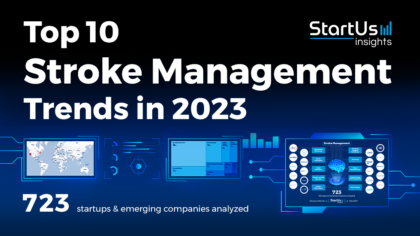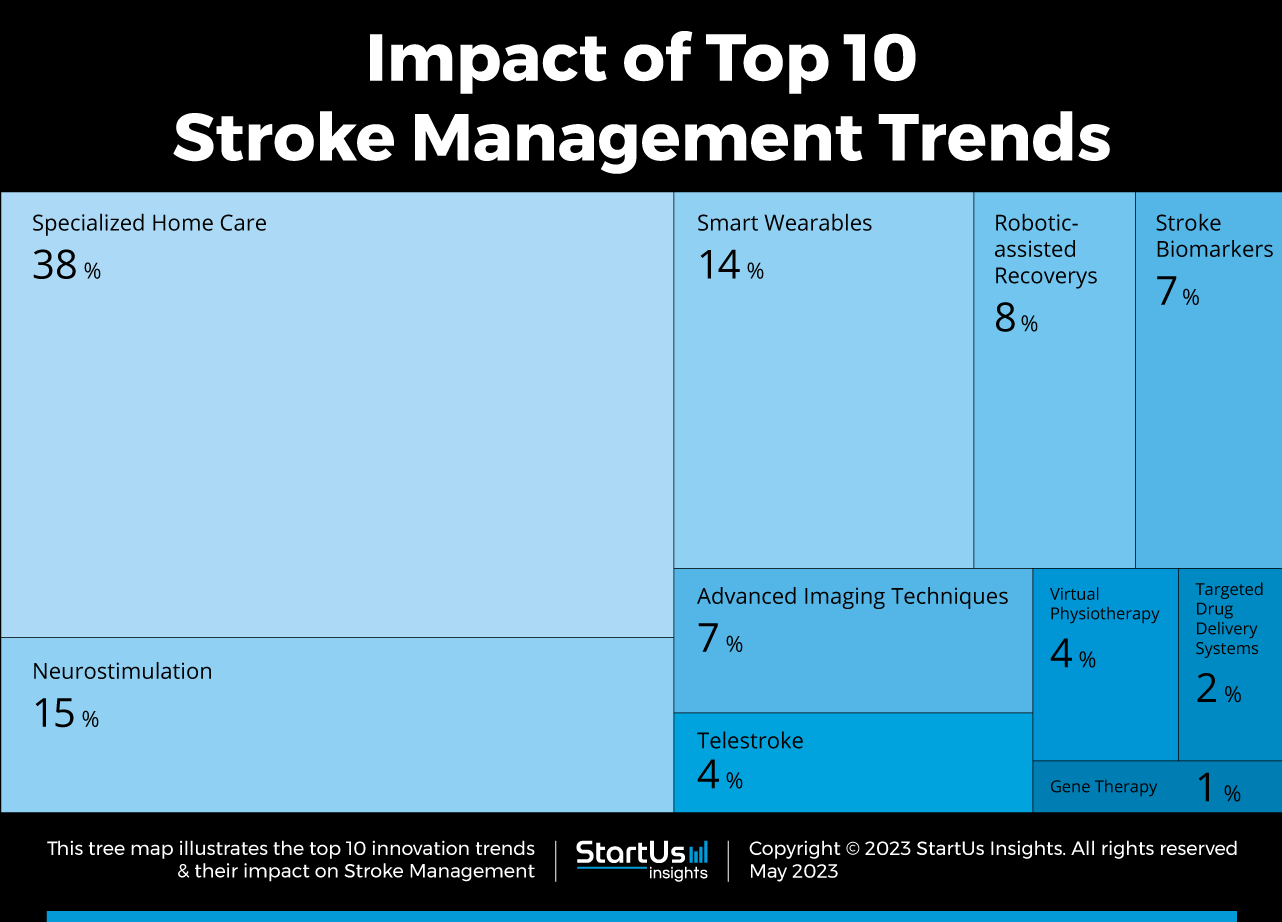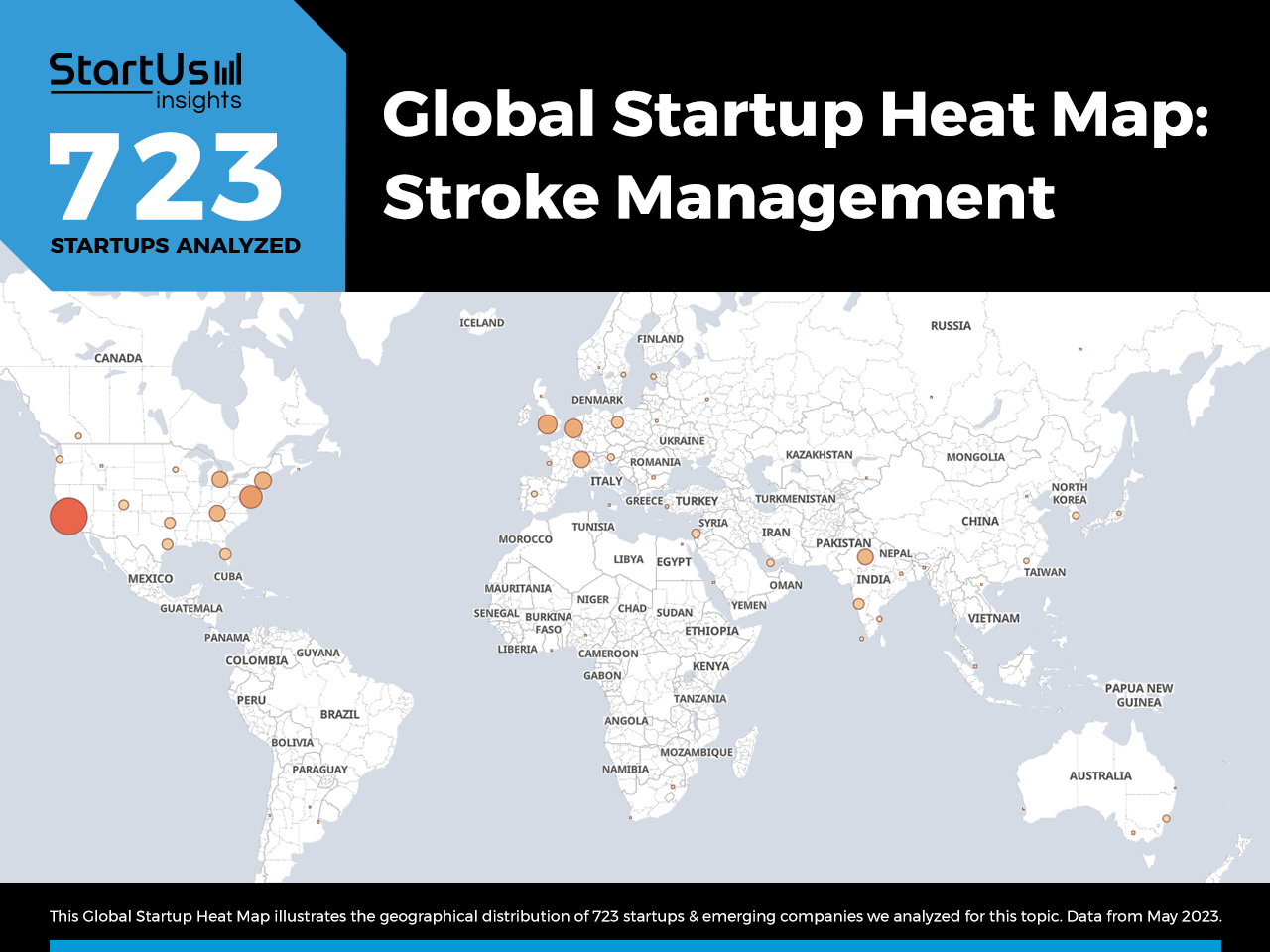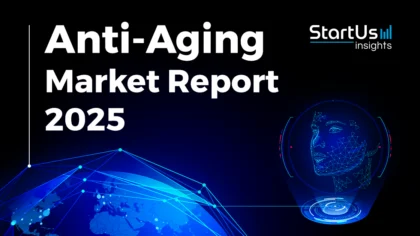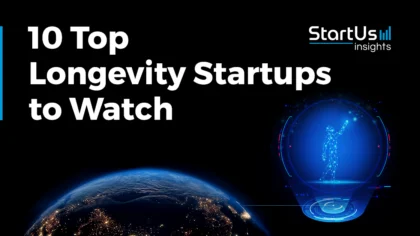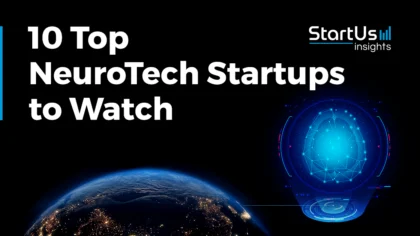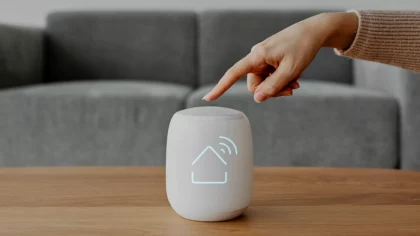Accelerate Productivity in 2025
Reignite Growth Despite the Global Slowdown
Strokes pose a significant challenge to healthcare as it requires immediate and accurate assessment, treatment, and rehabilitation. Emerging companies work to minimize long-term disability and improve patient outcomes. However, stroke management often involves complex processes, coordination among healthcare professionals, and personalized care plans. Technology innovations in telemedicine and AI now detect strokes early, while robotic devices aid in rehabilitation therapies. By leveraging these technologies, the healthcare industry improves access to specialized care, enhances diagnostic accuracy, optimizes treatment strategies, and provides effective rehabilitation. These stroke management trends and innovations improve the quality of medical care in hospitals and clinics and enable remote stroke care.
Innovation Map outlines the Top 10 Stroke Management Trends & 20 Promising Startups
For this in-depth research on the Top 10 Stroke Management Trends & Startups, we analyzed a sample of 723 global startups & scaleups. This data-driven research provides innovation intelligence that helps you improve strategic decision-making by giving you an overview of emerging technologies in the healthcare industry. In the Stroke Management Innovation Map below, you get a comprehensive overview of the innovation trends & startups that impact your company.
These insights are derived by working with our Big Data & Artificial Intelligence-powered StartUs Insights Discovery Platform, covering 3 790 000+ startups & scaleups globally. As the world’s largest resource for data on emerging companies, the SaaS platform enables you to identify relevant technologies and industry trends quickly & exhaustively.
Tree Map reveals the Impact of the Top 10 Stroke Management Trends
Based on the Stroke Management Innovation Map, the Tree Map below illustrates the impact of the Top 10 Stroke Management Trends. Innovations like specialized home care, telestroke, and virtual physiotherapy improve the accessibility of stroke care to patients even in remote regions. While smart wearables, neurostimulation, and robotic-assisted recovery focus on providing continuous stimuli to enhance stroke recovery and monitor its progress. Besides this, advances in stroke biomarkers and advanced imaging techniques through AI and analytics enable professionals to better identify signs of stroke. Lastly, gene therapy focuses on the modification of genes to prevent the risk of stroke with targeted drug delivery systems reducing problems such as side effects from current treatment methods.
Top 10 Stroke Management Trends (2023)
- Specialized Home Care
- Neurostimulation
- Smart Wearables
- Robot-assisted Recovery
- Stroke Biomarkers
- Advanced Imaging
- Telestroke
- Virtual Physiotherapy
- Targeted Drug Delivery Systems
- Gene Therapy
Global Startup Heat Map covers 723 Stroke Management Startups & Scaleups
The Global Startup Heat Map below highlights the global distribution of the 723 exemplary startups & scaleups that we analyzed for this research. Created through the StartUs Insights Discovery Platform, the Heat Map reveals high startup activity in the USA, followed by Western Europe & India. Below, you get to meet 20 out of these 723 promising startups & scaleups as well as the solutions they develop. These stroke management startups are hand-picked based on criteria such as founding year, location, funding raised, & more. Depending on your specific needs, your top picks might look entirely different.
Top 10 Stroke Management Trends in 2023
1. Specialized Home Care
Stroke management includes numerous challenges such as limited access to personalized care, inconsistent monitoring, and difficulties in engaging elderly patients. However, these challenges are being tackled through the development of specialized home care solutions that prioritize physical and mental activities. These solutions serve as convenient and accessible platforms for stroke patients to receive personalized care within the familiar environment of their own homes. Further, these apps offer a diverse array of interactive exercises and cognitive stimulation programs that cater specifically to their unique needs. By incorporating gamification elements like rewards and challenges, these apps foster engagement and motivation, making the rehabilitation journey more enjoyable and sustainable.
ABAStroke advances At-Home Rehabilitation
Polish startup ABAStroke develops digital solutions for neurological rehabilitation of cognitive deficits post-stroke. Its mobile app combines applied behavior analysis (ABA) methodology and machine learning algorithms to provide personalized treatment. The app initially assesses the types and levels of cognitive deficits and then creates a personalized rehabilitation path with targeted exercises. The path features continuous optimization through the collection of data with each session. Through ABA-derived methods and gamification, patients are motivated to use the app regularly, potentially leading to faster health improvement.
myReha develops Personal Therapy For Language & Memory
Austrian startup myReha provides a digital platform for stroke patients to address issues in language, cognition, and daily skills. The tablet-friendly app uses evidence from current medical research that offers multiple tasks in a tailored therapy plan. The app also continuously adjusts the exercise plan based on the user’s strengths and weaknesses. It includes a modern speech analysis feature that provides precise feedback on pronunciation. Further, it features a weekly plan that guides the user on what to train each day. myReha enables stroke, long covid, and dementia patients to retain and improve their language functions.
2. Neurostimulation
The limited effectiveness of traditional therapies hinders the recovery process for stroke patients. However, startups are leveraging neurostimulation techniques to expedite recovery and enhance care quality. Neurostimulation involves applying external stimuli or impulses to the brain, promoting neural activity, and fostering neuroplasticity. This also plays a vital role in the brain’s ability to reorganize and form new connections. Techniques like transcranial magnetic stimulation (TMS) and transcranial direct current stimulation (tDCS) target specific brain regions to facilitate functional recovery. When combined with conventional therapies, such as physical and occupational therapy, these techniques accelerate the healing process. By stimulating neural networks, neurostimulation offers a non-invasive approach to stroke rehabilitation. This, in turn, improves motor function, cognitive abilities, and overall quality of life for stroke survivors.
nuroflux creates a Brain Monitor
Australian startup nuroflux develops a wearable device for non-invasive, real-time monitoring of brain activity and blood flow. The device uses a proprietary sensor array to capture datasets in real time for deep-learning analysis. Besides this, the multi-modal wearable monitors patients with conditions such as delirium where hypoperfusion is suspected to play a role. nuroflux provides first responders and clinicians with real-time objective insights. The company envisions its technology having broad utility beyond stroke care, potentially benefiting patients with conditions like delirium and cognitive enhancement.
Dextrain improves Manual Dexterity
French startup Dextrain develops technology for improving neuro-recovery and prediction, focusing on manual dexterity. Its product, Dextrain Manipulandum, is an ergonomic tool that incorporates force sensors for precise measurement of finger movements. It offers a panel of visuomotor and audio-motor training exercises to optimize the recovery of key dexterity components. Dextrain also provides a tablet-based app, Dextrain Homecare, that assesses multiple sensorimotor components of manual dexterity. Both products provide patient-specific profiles of impairment and personalized training programs, improving everyday life as well as their quality of life.
3. Smart Wearables
Stroke survivors face a higher risk of complications like recurrent strokes, heart problems, and infections. To mitigate these risks, wearable devices with advanced sensors and connectivity features such as smartwatches, and fitness trackers provide a powerful tool for stroke management. By continuously monitoring vital signs, activity levels, and sleep patterns, wearables offer real-time data to both patients and healthcare professionals. This monitoring capability enables early detection of warning signs, facilitating prompt intervention and reducing the likelihood of complications. Moreover, wearables are able to integrate with specialized apps that offer personalized exercise programs and medication reminders. This combination of monitoring and interactive features empowers stroke survivors to actively participate in their recovery journey and adopt a healthier lifestyle.
Knitgen creates Intelligent Yarns
UK-based startup KnitRegen develops textile technology for muscle training and recovery, particularly for stroke patients. The startup’s wearable therapy solution involves smart textile components, including a unique bead that integrates into everyday garments. The bead delivers timed impulses to selectively activate or suppress muscle activity, aiding in the recovery of body movement after a brain injury. The technology finds applications in neurological rehabilitation for various conditions and in muscle training for sports and well-being activities.
Zeit Medical manufactures a Smart Headband
US-based startup Zeit Medical monitors brain health, particularly for those at risk of neurological injury. Its smart headband continuously monitors the electrical activity of the brain using artificial intelligence to identify patterns from neurological injuries such as stroke or seizure. The technology also enables hospitals to continuously monitor multiple patients with automatic prescreening and annotation of large datasets. It also gives immediate diagnosis and treatments which promotes better at-home patient management and recovery. The startup’s solution serves to provide expert-level brain health monitoring in all settings, with a focus on patient-centered care. The headband is designed for both hospital and home use, providing continuous monitoring, fast access to treatment, and patient management.
4. Robot-assisted Recovery
Stroke survivors often require repetitive and intensive rehabilitation to regain lost functions which is difficult to provide through conventional methods. Robotic-assisted devices, such as exoskeletons and robotic limbs, offer a unique approach to stroke rehabilitation. These devices assist patients in regaining mobility, strength, and coordination by providing precise and controlled movements during therapy sessions. By incorporating advanced sensors and algorithms, robotic-assisted devices are able to tailor rehabilitation programs to individual needs and track progress over time. They offer real-time feedback, helping patients improve their motor skills and providing motivation throughout the recovery process. Additionally, robotic-assisted recovery allows for intensive and repetitive training, which has been shown to enhance neuroplasticity and promote functional gains.
Houston Bionics provides Exoskeletal Robotics
US-based startup Houston Bionics supports neurorehabilitation through the use of advanced technology. Its product, ExoRehab X, is a wearable arm exercise device for stroke recovery that constantly monitors the electrical activity of the brain and provides immediate assistance. ExoRehab X is based on exoskeletal robotics systems that aid stroke patients during physical therapy sessions. The startup’s wearable exercise device promotes neuroplasticity in stroke survivors and lets them regain their independence. Besides this, it also makes therapy more accessible and convenient by allowing patients to continue their therapy at home.
REEV offers Smart Exoskeletons
French startup REEV develops smart exoskeletons to enhance daily mobility for people suffering from gait disorders. The startup’s solution REEV SENSE is a connected IMU sensor that uses motion analysis algorithms to provide precise and personalized gait reports through a mobile app. Its other solution DREEVEN is a lightweight and intelligent motorization for medical orthosis that assists in walking, standing up, sitting down, and climbing stairs. Both products aim to expand daily activities, gain confidence outdoors, and promote rehabilitation through autonomy.
5. Stroke Biomarkers
The lack of prompt detection of stroke is highly detrimental to initiating time-sensitive interventions that minimize brain damage and improve outcomes. To prevent this problem, startups are developing biomarker indicators that reflect biological processes associated with stroke. By identifying and analyzing specific biomarkers in blood, cerebrospinal fluid, or imaging scans, healthcare professionals gain valuable insights into the underlying mechanisms of stroke and make informed decisions regarding treatment strategies. They also assist in determining the severity and prognosis of the stroke, guiding the development of personalized treatment plans. Furthermore, biomarkers are able to monitor the response to therapy, allowing for adjustments and optimization of treatment approaches.
Precision Health Reports provides Disease Risk Assessment
US-based startup Precision Health Reports provides comprehensive diagnostic tools to identify individual cardiometabolic disease risks. The startup offers a complete diagnostic report that integrates relevant individual medical history, NMR-measured biomarkers, and over forty risk factors from various guidelines. Its cardiometabolic risk assessment identifies each patient’s unique risk for metabolic syndrome and type-2 diabetes. The startup uses advanced lipoprotein biomarkers, relevant clinical history, and multiple national and international guidelines to provide a clear picture of each patient’s cardiometabolic health. The assessment process includes a clinical history survey, a blood draw for biomarker analysis, and a comprehensive diagnostic report.
Neurobit provides Predictive Precision Medicine
US-based startup Neurobit uses artificial intelligence to simplify the analysis of health data for better clinical decisions, starting with sleep data. Its AI-enabled sleep scoring system, Neurobit PSG, provides sleep data to researchers, healthcare providers, sleep labs, and enterprises. It integrates seamlessly into existing workflows, uses AI technology to process the large database, and ensures high-level data security. Neurobit also offers SleepFit360 – a solution that measures over thrity sleep biomarkers with a chest-worn tracker and provides a comprehensive overview of sleep patterns. In this way, the startup’s solution enables people to identify patterns associated with stroke during their sleep cycle.

6. Advanced Imaging Techniques
Stroke management encounters various challenges, including the need for accurate and timely diagnosis, assessment of the extent of brain damage, and monitoring treatment response. Innovations in computed tomography (CT), magnetic resonance imaging (MRI), and positron emission tomography (PET), provide more precise images to better understand the location and severity of strokes. Moreover, advanced imaging techniques offer insights into the extent of brain damage, guiding treatment decisions and rehabilitation strategies. They enable the visualization of affected brain regions, blood flow patterns, and metabolic changes, providing valuable information for prognostication and individualized care planning. Additionally, these techniques monitor treatment response over time, allowing for adjustments and optimization of therapeutic approaches.
Omniscient Neurotechnology visualizes Critical Brain Networks
O8t is a US-based startup that offers a cloud-based solution for brain health physicians to better understand their patients’ brain networks. Its Quicktome scan uses data from a single, non-invasive MRI, processes it automatically, and presents it in an intuitive web-based app. The technology allows for the visualization of clinically critical brain networks, aids in preserving functional independence, and reduces the risk of post-surgical deficits. It also facilitates informed and engaged patient conversations around surgical outcomes. Quicktome also integrates with hospital picture archiving and communication systems (PACS), enabling remote review and export of processed scans.
Circle Neurovascular Imaging advances Automatic Flagging
Circle Neurovascular Imaging is a Canadian startup that specializes in acute stroke care pathways through simple image interpretation and collaboration. Its solution StrokeSENS automatically flags suspicious cases and includes advanced tools such as AI-assisted identification of early ischemic changes. It also features time-resolved CT angiography and automatic identification of large vessel occlusion. Circle Neurovascular Imaging supports medical front lines in moving patients to the right treatments, faster, through tools that optimize imaging.
7. Telestroke
Stroke patients currently face significant challenges related to timely access to specialized care, particularly in remote or underserved areas. Telestroke addresses this through the use of telecommunication technology to connect healthcare professionals in different locations, enabling remote assessment and treatment of stroke patients. Through video conferencing and real-time image sharing, neurologists remotely evaluate patients, review imaging scans, and make time-sensitive decisions regarding thrombolytic therapy or other interventions. Telestroke programs provide a direct line of communication between stroke specialists and emergency department physicians, facilitating immediate expert consultation, even in locations without on-site stroke expertise. Additionally, telestroke enables ongoing follow-up and rehabilitation support through virtual consultations and remote monitoring, ensuring that stroke survivors receive comprehensive care beyond the acute phase.
Imago Rehab advances Occupational Therapy
Imago Rehab is a US-based startup that offers virtual occupational therapy services for adults impacted by neurologic conditions, including stroke, brain injury, and Parkinson’s disease. The startup’s therapy involves teaching patients to think like therapists during their everyday tasks, promoting recovery and the integration of practice throughout the day. Imago Rehab also provides a soft robotic glove to aid in upper limb recovery after a stroke. The device enables therapy patients to partake in therapy sessions from the comfort of their own home environment. Imago Rehab’s solution makes specialized occupational therapy services accessible through telehealth, allowing patients to directly apply new skills at home.
Sevaro develops Evidence Based Telemedicine
Sevaro is a US-based startup that provides custom telestroke programs and technologies for hospitals. Its solutions include OneCall which allows hospitals to connect with medical practitioners within 45 seconds eliminating the need for call centers and reducing communication delays. Sevaro also develops Synapse 2.0, a single-window care system that enables providers to maintain high productivity levels while providing quality care to patients. It includes features such as missed call tracing, smart assistance for documentation, and internal communication with peer doctors for clinical discussions. Sevaro improves healthcare access and delivery through its telehealth solutions.
8. Virtual Physiotherapy
Stroke patients, in particular, those of advanced ages face challenges in accessing physiotherapy services like attending in-person sessions, and the need for ongoing rehabilitation. However, startups are overcoming this through the implementation of virtual physiotherapy that delivers remote rehabilitation services to stroke patients. Through video conferencing platforms, stroke survivors are able to connect with physiotherapists or perform therapy sessions from the comfort of their own homes. This eliminates the need for travel and facilitates access to specialized care, particularly for those living in remote areas. Virtual physiotherapy sessions can include exercises, stretches, and therapeutic activities tailored to the individual’s needs and goals. Additionally, virtual platforms offer interactive tools, such as video demonstrations and exercise trackers, to enhance engagement and motivation. Virtual physiotherapy allows for regular and consistent therapy sessions, ensuring the continuity of rehabilitation beyond traditional in-person visits.
Naive Innova develops a Nanocarrier Platform
NeuroTechR3 is a US-based startup that increases access to neuromotor exercises for people with disabilities. The startup’s solution R3THA is a rehabilitation technology for hand and arm function that uses Exergame technologies. It also allows individuals to use it for home exercises on their own, using a self-calibration system. NeitoTechR3 also develops HoVRS which is a home-based virtual rehabilitation system for academic research. The startup solution serves as a personalized rehabilitation system to assist children and adults improve hand and arm function.
Cureosity advances VR-based Immersive Therapy
Cureosity is a German startup that uses virtual reality (VR) to provide rehabilitation for patients with neurological conditions. Its VR therapy system CUREO motivates patients through gamification and adapts to specific objectives. It uses a modular development environment for maximum customization and is usable anywhere due to its wireless mobile capabilities. CUREO also features an avatar based on biomechanical movement model tracking in real-time, which enhances the immersive experience. Cureosity improves rehabilitation by making it more engaging and efficient through the use of VR technology.
9. Targeted Drug Delivery Systems
Systemic drug delivery limitations, side effects, and brain targeting challenges hinder stroke management, necessitating innovative solutions to improve treatment outcomes. Therefore, targeted drug delivery techniques deliver medications directly to the site of the stroke or the affected areas of the brain. These systems bypass the blood-brain barrier and deliver therapeutic agents precisely where they are needed, increasing their efficacy and minimizing systemic side effects. Startups are developing various approaches including nanoparticle-based drug carriers, implantable devices, and controlled-release systems. These targeted drug delivery systems enhance the bioavailability of medications, optimize their therapeutic effects, and reduce the risk of adverse reactions.
Neurevo creates Neuroprotective Therapeutics
Neurevo is a German startup that focuses on developing neuroprotective therapeutic lead candidates for multiple neurological disorders, including stroke, Parkinson’s disease, and ALS. Its solutions reduce intracellular calcium, protect mitochondrial function against environmental toxins or protein aggregates, and increase energy production. For stroke patients in particular, the startup features animal models in global ischemia, middle cerebral artery occlusion, and endovascular swine. These models also showcase full protection and motor function recovery with no signs of toxicity. For Parkinson’s disease, its solution provides a very good neuroprotective effect in a toxin-induced animal model. The startup provides solutions for unmet medical needs in the areas of stroke recovery and management.
Asha Therapeutics identifies and drugs Difficult To Hit Targets
Asha Therapeutics is a US-based startup that creates novel therapeutics targeting validated, disease-relevant mechanisms. Its proprietary PRISM platform uses a set of proprietary algorithms and advanced simulation programs. This enables targetability determination, disease relevance, compound design, and prediction of drug-like properties. The startup creates therapeutics for devastating neurological conditions such as Parkinson’s disease, Alzheimer’s disease, stroke, and others. Its approach involves maintaining the health and efficiency of the mitochondrial network, a vital component of cellular health and function. The startup eliminates neurological diseases through a combination of computational and medicinal chemistry to treat unmet medical neurological diseases.
10. Gene Therapy
The risk of stroke continuously rises with age and currently have limited treatment options for promoting brain repair and recovery. Gene therapy overcomes these issues through the delivery of genetic material into cells to modify their function or promote tissue repair. In the context of stroke, gene therapy holds great potential for stimulating neurogenesis, enhancing synaptic plasticity, and reducing inflammation. Genetic therapies are able to deliver growth factors, such as brain-derived neurotrophic factor (BDNF), to promote neuronal regeneration and improve functional outcomes after stroke. Additionally, gene therapy targets specific molecular pathways involved in stroke pathogenesis, mitigating neuronal death, and protecting against secondary damage.
Remedium Bio provides Disease Modifying Treatments
Remedium Bio is a US-based gene therapy startup that develops treatments for large unmet clinical needs. Its gene therapy platform Prometheus enables safe, effective, and durable delivery of therapeutic genes while allowing for simple post-treatment dose adjustment. Moreover, Remedium uses adeno-associated virus (AAV) and lipid nanoparticles (LNP). These vectors are characterized and established, proving effective in a broad range of patients and therapeutic indications. Its product pipeline for regenerative therapeutics features a disease-modifying treatment for ischemic stroke, named RMD-1501. Remedium’s pipeline also includes gene therapy treatments in the fields of weight loss, Type 2 diabetes, and osteoarthritis.
Galventa provides Energy Supplements
Galventa is a Swiss startup that specializes in galenic formulations of supplements that feature high bioavailability and efficacy for consumers. Its products include B-SYNC ON, a wake-up pill designed to support and improve the waking process. B-SYNC OFF is a supplement for induces sleep and promotes regenerative processes during sleep. Lastly, B-SYNC NOW is an energy supplement that lifts mood and energy levels with natural stimulants and a dual-release mechanism. Moreover, Galventa’s galenic technology allows for faster uptake and a sustained release of the active ingredients.
Discover all Stroke Management Trends, Technologies & Startups
Advanced imaging significantly reduces the time and effort of medical professionals in determining stroke treatment plans. While exoskeletal systems provide mobility and also monitor patients to create customizable plans and let doctors remotely monitor their patients. These innovations bring significant benefits to stroke management, including enhanced diagnostic accuracy, improved access to care, personalized treatment plans, and optimized rehabilitation strategies. The stroke management trends & startups outlined in this report only scratch the surface of trends that we identified during our data-driven innovation & startup scouting process. Identifying new opportunities & emerging technologies to implement into your business goes a long way in gaining a competitive advantage.
